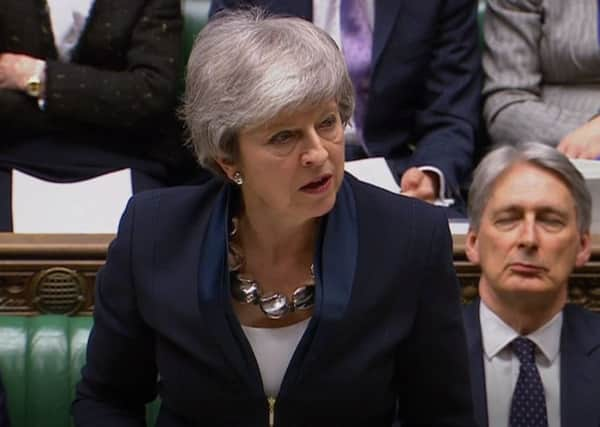May’s great Brexit betrayal is a denial of democracy – Brian Monteith


If parliament votes for the delay –as it is highly likely to do given that it has an inbuilt majority against ever leaving at all, and the EU can be expected to grant the extension – then it will be a failure of democracy unparalleled in British history.
In 1975 we had a people’s vote that agreed to endorse the terms of EEC membership renegotiated by the Labour government. This outcome was accepted as binding and we got on with our lives. Those who had voted to leave the EEC were disappointed but moved on. There was no campaign for a second referendum.
Advertisement
Hide AdAdvertisement
Hide AdThere then followed nine British general elections where membership of the EEC (that later became the EU) was not a significant issue. Unemployment, taxes, the NHS and other issues were well ahead of concerns about “Europe”. Indeed those parties that voiced opposition to EU membership could not win seats in parliament, not even in by-elections, until Douglas Carswell and Mark Reckless resigned their seats and gave their constituents the opportunity to re-elect them.
Recognising the degree of public concern about EU-related issues that had grown over the years and for which Ukip had become a lightning rod, David Cameron was elected in 2015 offering to renegotiate a new relationship with the EU and offer a referendum on continuing membership.
We had a second people’s vote with the largest turnout in any referendum or election since universal suffrage was achieved, deciding to leave. It was the biggest vote in our history, with a majority of some 1.5m, but unlike before there has been a campaign from that day by many wealthy and influential establishment figures to refuse to accept the outcome.
Less than a year later we then had another People’s Vote, this time a general election. Both the Conservatives and Labour parties said they would respect the referendum result and promised to deliver a Brexit that would take us outside the single market and customs union. Parties that took such positions attracted over 80 per cent of the vote – but no sooner had many of the MPs elected on these pro-Brexit platforms taken their seats than they were working to frustrate and reverse the people’s choice. This week they got their way.
Advertisement
Hide AdAdvertisement
Hide AdOn Monday, Labour, in a desperate attempt to stem the loss of pro-EU MPs to a new Independent Group, went back on its election promises and is now offering to run a further referendum.
A day after that the Prime Minister announced her own U-turn.
There will be a series of votes where MPs can decide to reject the PM’s Withdrawal Agreement – and they should because it divides our country, is a surrender of our money, our borders and our law-making for all time without any escape.
If her EU deal is rejected, MPs can then choose to not leave until there is a deal. If that’s passed they will then be offered the opportunity to request a time extension for negotiations. The prospect of never leaving becomes real.
Advertisement
Hide AdAdvertisement
Hide AdLike a trade union negotiator the Prime Minister can only extract an “offer” by using the leverage that comes from being willing to walk away.
Extending the negotiating period without having leverage means there will be no better offer – just further chaos and uncertainty. MPs must keep the time limit. To do otherwise disarms the prime minister, betrays Brexit and betrays democracy.